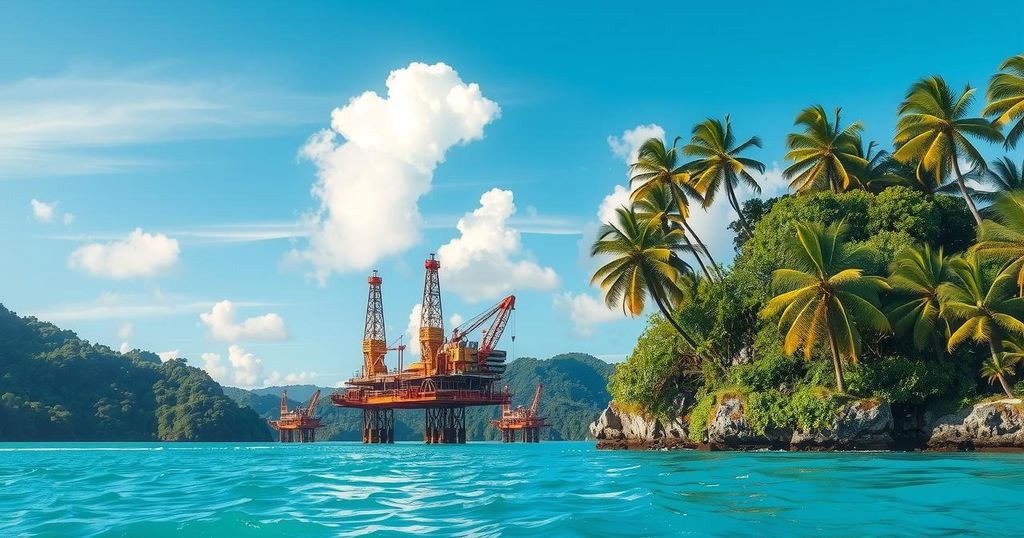Suriname Votes in Crucial Elections Amid Oil Wealth Potential

Suriname is holding parliamentary elections to decide on leadership capable of managing newfound oil wealth. Facing major economic challenges, candidates stress the importance of utilizing oil revenues for development while maintaining environmental sustainability. With a new fund in place to distribute wealth, the focus now shifts to how effective the new government will be in enhancing citizens’ lives amidst geopolitical tensions involving China and the US.
Voting kicked off in Suriname on Sunday, marking a pivotal moment for the nation’s future amid a surge of potential oil wealth. Suriname, the smallest country in South America and the only one with Dutch as its official language, faces challenges like high debt and swelling inflation affecting nearly one in five of its citizens. However, recently discovered offshore oil reserves promise economic transformation for the country’s roughly 600,000 residents, possibly shifting its fortunes from rags to riches.
“It will be a huge amount of income for the country,” said President Chan Santokhi in a recent AFP interview, as he highlighted the government’s capability to improve the lives of its people with these new resources. On this election day, citizens will select a new parliament, consisting of 51 members, who will soon elect a president and vice-president to guide the country for the next five years. Despite being eligible for a second term, Santokhi faces an unpredictable political landscape, with no clear frontrunners.
Defence Minister Krishna Matheora emphasized the essentials for a stable economy are already established and urged support for Santokhi’s Progressive Reform Party (VHP) to maintain progress. According to experts, the newfound oil reserves could yield billions in revenue over the next couple of decades. TotalEnergies has committed $10.5 billion to exploit a nearby oil field projected to generate 220,000 barrels of oil daily, with operations scheduled to start in 2028. The government has also set up a “Royalties for Everyone” fund to distribute oil revenue directly to citizens.
A total of fourteen parties participated in this election, featuring Santokhi’s centrist VHP and the left-leaning National Democratic Party (NDP), which is led by the descendants of former authoritarian leader Desi Bouterse. The other significant contender is Vice President Ronnie Brunswijk’s General Liberation and Development Party (ABOP), who has a complex history taking on Bouterse’s regime during the 1980s. Provisional election results are expected to roll in by late Sunday.
As Suriname approaches the 50th anniversary of its independence from the Netherlands this November, it has forged closer ties with China, a partnership that has deepened since its 2019 entry into the Belt and Road Initiative. This strategic alignment aims to boost trade and political cooperation. In a related diplomatic move, US Secretary of State Marco Rubio visited Suriname in March, reflecting Washington’s interest in countering China’s influence in Latin America.
Rich in natural resources, over 90% of Suriname’s terrain is forested, and it holds the distinction of a negative carbon footprint, a reality that Santokhi assures will remain safeguarded. He noted that Suriname’s oil wealth can be harnessed to promote a shift towards green energy, stating, “fossil energy is limited… it will be gone after 40 years.” Dedicated to sustainable development, the administration’s approach appears to be cautiously optimistic amidst the looming potential of an oil windfall.
Suriname’s elections represent a critical juncture as emerging oil wealth could significantly alter its socio-economic landscape. With a focus on stability, and the promise of revenue distribution through a new fund, the elected leaders will face immense pressure to deliver benefits. The balance between harnessing oil resources and maintaining environmental integrity will be key to the nation’s long-term strategies for growth. As this small country’s political narrative evolves, its alliance with China and reactions from the US highlight the complex geopolitical dynamics at play.
Original Source: www.rfi.fr







